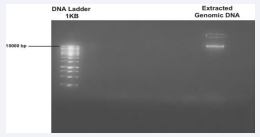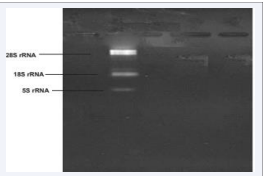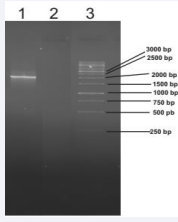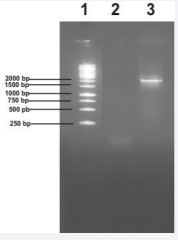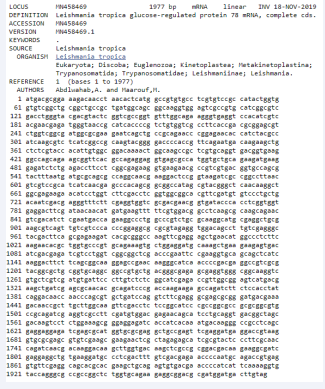Detecting the Presence of GRP-78 Gene in Syrian Strain of Leishmania tropica Genome and Sequencing it
- 1. Department of Microbiology, Leishmania Center for Epidemiological and Biological studies, Faculty of Pharmacy, Damascus University, Damascus Syria
- 2. Department of Biochemistry, Faculty of Pharmacy, Damascus University, Syria
Abstract
Background: Leishmania tropica is the main cause of cutaneous leishmaniasis which represents a common issue in Syria. After the onset of the current war, cutaneous leishmaniasis has become yet more widespread, so an effective vaccine is needed to prevent the large scale spread of leishmania in the country. DNA vaccination is a promising approach for developing such needed vaccine against leishmaniasis. Glucose-regulated protein 78 plays important roles in Leishmania parasite life. The gene that codes this protein had been used as DNA vaccine against infections by different species of Leishmania, so this gene represents a good candidate for DNA vaccine designing. But the existence of glucose-regulated protein 78 gene has not yet been proven in the genome of Leishmania tropica. So, this study aims to detect the existence and the expression of glucose-regulated protein 78 gene in Syrian strain of Leishmania tropica promastigotes.
Materials & Methods: The DNA and RNA were isolated from Syrian strain of Leishmania tropica parasites, the cDNA was synthesized, necessary primers for genes’ amplification were designed manually, the PCR conditions were optimized and cDNA was used as a template. Full-length double-stranded sequence analysis was performed.
Results: Extracted genomic DNA and total RNA showed high degree of purity and integrity. GRP78 PCR products showed by gel electrophoresis, on the level of DNA and cDNA, only one band belongs to the gene, and their sizes were approximately 1977 bp. The sequence of the cDNA-GRP78 gene was determined and published in GenBank, and the precise size of the gene was 1977 bp. Expression was also demonstrated at the level of cDNA.
Conclusion: Glucose-regulated protein 78 gene is a part of Syrian strain of L. tropica, the expression of this gene has been demonstrated. The sequence of the cDNA of glucose-regulated protein 78 gene has been defined and submitted to the Genbank with accession number NO. MN458469.
Keywords
• Leishmania tropica, glucose regulated protein 78
gene, Syria
Citation
Maarouf M, Abdlwahab A (2021) Detecting the Presence of GRP-78 Gene in Syrian Strain of Leishmania tropica Genome and Sequencing it. Ann Clin Med Microbiol 5(1): 1026.
INTRODUCTION
Leishmaniasis is an endemic disease in tropical areas, this infection is caused by parasites of the genus Leishmania. The disease represents three main forms cutaneous: the most common form, mucocutaneous: which is accompanied with mutilative effects, and visceral: the fatal form of the disease if not treated.
Leishmaniasis is found in 98 countries, 12 million people had been affected, annually there is a rise by 1.5 million new cases (1). Cutaneous leishmaniasis cases count 1 to 1.5 million per year, more than 85% of these cases occur in 10 countries. Syria is included in these 10 countries (2).
Cutaneous leishmaniasis CL has been an endemic disease in Syria throughout history, especially in the western region of the country. Leishmania tropica is the main causative of anthroponotic CL which is the most common form of CL in Syria. The number of CL cases in Syria is constantly increased, but after the onset of the civil war in the country, these increases have been more aggravated due to the deterioration of the health and medical situation in Syria influenced by the war (3).
The treatment of cutaneous leishmaniasis nowadays depends basically on chemotherapy, which faces serious obstacles such as, the toxicity of the drugs, high cost, insufficient efficacy, undesirable route of drug delivery and drug resistance development, thus the development of a Leishmania vaccine represent one of the most cost-effective, safe, and effective means for disease controlling and eliminating (4).
DNA vaccination is relatively new approach that depends on DNA molecules which are modified by genetic engineering in order to elicit a protective immune response. This new technology is achieved using DNA plasmids that are recombinant by desirable antigens genes. Specific humoral and cellular immune response are being induced by these recombinant DNA plasmids against parasites for instance (5).
Heat shock proteins are considered as conserved protein families in nature. Proteins of this families possess suitable immunogenic properties and are called pan antigens. These pan antigens represent the most potent candidates for vaccine design due to their ability to elicit specific and strong immune responses (6).
Glucose-regulated protein 78 (GRP78) is a member of heat shock protein (HSP70) family. This protein had elicited a protective immune response when administrated as DNA vaccine (7), or as recombinant protein vaccine (8) against many species of Leishmania.
GRP78, also called immunoglobulin heavy chain binding protein BiP, includes a signal peptide sequence that is orientated toward the endoplasmic reticulum ER, this peptide plays a role as molecular chaperone, which contributes to the proper fold of proteins and the assembly process, GRP78 as chaperon degrades abnormal proteins by proteasome activity, binds ER Ca2+, and controls the transmembrane ER stress sensors activation (9). This protein is found in both amastigote and promastigote forms of leishmania parasite (10).
Thus, due to the important roles of glucose-regulated protein 78 in the life of the parasite and its ability to induce an immune response when used as a DNA vaccine or as recombinant protein against infection with Leishmania species, we can say that glucose-regulated protein 78 and its gene represent good candidates for designing anti-leishmanial vaccine.
The presence of glucose-regulated protein 78 gene had not yet been demonstrated in Leishmania tropica genome, consequently not sequenced either yet, so we choose glucose-regulated protein 78 gene to investigate its presence in LCED Syrian 01 strain of L. tropica genome as a first step to examine it as DNA vaccine against the infection with L. tropica, which is the main causative agent of the majority of cutaneous leishmaniasis cases in Syria.
This present systematic study is the first to investigate the presence of this gene in LCED Syrian 01 strain of L. tropica genome, to prove if there is an expression of this gene in these parasites and to sequence it.
MATERIALS AND METHODS
Parasite culture
LCEB-Syrian Strain 01 of Leishmania tropica was provided by Leishmania Center for Epidemiological and Biological Studies, Damascus University. Promastigotes were grown in RPMI -1640 medium (Lonza-USA) supplemented with 5% fetal calf serum.
Genomic DNA extraction
DNA extraction kit (Promega, USA) was used to extract the Leishmania genomic DNA from the promastigotes according to the manufacturer’s instructions, the extracted DNA was electrophoresed on 1% agarose gel.
Total RNA extraction and cDNA synthesis
5ml of RPMI medium containing promastigotes was centrifuged at 12000g for 5 minutes. The pellet was washed with PBS [pH=7.2] 3 times. The total RNA was extracted by RNA extraction kit (Gene JET RNA Purification Kit Thermo Scientific Lithuania) and was electrophoresed on 1% agarose gel. cDNA was synthesized by RevertAid First Strand cDNA Synthesis kit (Thermo Scientific, Lithuania) using oligo dT18 primers according to the manufacturer›s instructions.
Primers design and PCR amplification of GRP78 gene:
Primers were designed by making alignment for GRP78 gene sequence of Leishmania species by CLC main workbench 7 programs. For L. major (Accession NO. XM_001684350.1), L.donovani (Accession NO. XM_003862182.1), L. infantum (Accession NO. XM_001470124.1) L.mexicana (Accession NO. XM_003876912.1). The sequences are identical in the terminal ends of the gene, so we took the mutual 16 bases from the beginning and 20 bases at the end of the gene. The primers were tested by an online application: http://www.idtdna.com/ calc/analyzer. The results illustrated melting temperatures and the possibility of conformation of self-dimers, hairpins and heterodimers. According to this application the melting temperature of forward primer was 65.2ºC and of reverse primer was 68.5 ºC. In order to design primers suitable for amplifying the desired sequence and in the same time make this amplified sequence ready to be recombinant in certain plasmid, restriction enzymes sites had been added. The sequence of the gene in all species were tested by the application: http://rna. lundberg.gu.se/cutter/ to determine which restriction enzymes cut the gene, it had been chosen EcoR1 and XbaI. Restriction sites of EcoR1 and XbaI restriction enzymes were added on ?5′ end of forward and reverse primers respectively. High purified primers were ordered from Alpha DNA, Montreal, Canada. Final sequences for primers were:
Forward primer introduced EcoR1 restriction site; 5′ GGA ATT CAT GAC GCG GAA AGA CA 3′. Reverse primer: introduced XbaI recognition site; 5′ GCT CTA GAC TAC AAG TCA TCC ATC GCG T 3′.
EcoR1 and XbaI restriction sites added for direct cloning in the pCI mammalian expression vector are underlined which promotes constitutive expression of cloned DNA insert in mammalian cells.
DNA and cDNA of GRP78 gene were amplified using Thermal cycler (Bio-Rad, USA) by hot start green master mix 2x kit (Promega, USA), and the designed primers. PCR protocol was optimized using Gradient annealing temperatures. PCR reactions performed in a 25μl mixture containing: 2.5μl of template DNA (220 ng) or cDNA (240 ng), 12.5μl of PCR master mix 2X, 8.5μl of distilled water and 1μl of each of primers (10 mM). Thermal cycling conditions were 95°C for 5min followed by 35 cycles of 95°C for 1min, 59°C for 45sec and 72°C for 1 min, finally 72°C for 5 min.
Sequence Analysis
Full-length double-stranded sequence analysis was performed on PCR products from cDNA by sequencing, using designed primers mentioned above on automated sequencers [ABI PRISM BigDye Terminator Cycle Sequencing Ready Reaction Kit, Perkin-Elmer, Foster City, USA].
RESULTS
Genomic DNA and total RNA extraction:
Extracted DNA electrophoresis on a 1% agarose gel showed only one band, (figure 1),
Figure 1: Electrophoresis of extracted Genomic L. tropica DNA on 1% agarose gel stained with ethidium bromide.
which demonstrated the absence of degradation of extracted DNA. The purity of the DNA was 1.78, which showed a high degree of purity in the extracted DNA.
The purity of the extracted RNA was 2.3, that reveals good purity of extracted RNA. The electrophoresis of extracted RNA on a 1.5% agarose gel, (figure 2),
Figure 2: Electrophoresis of extracted L. tropica RNA on 1.5% agarose gel stained with ethidium bromide
showed a standard profile, no DNA bands so there was no contamination with genomic DNA.
Amplification of glucose-regulated protein 78 gene using both extracted DNA and Synthesized cDNA
Gradient annealing temperatures were used to optimise PCR protocol, annealing temperature 55°C was selected due to its perfect suitability. Gel electrophoresis of GRP78 PCR products, on the level of DNA, (figure 3)
Figure 3: Amplification products of L. tropica ribosomal protein GRP78 on 1% agarose gel electrophoresis stained with ethidium bromide, lane 1: GRP78- DNA amplification product about 1977 bp. Lane 3: DNA ladder 1 kb.
and cDNA, (figure 4),
Figure 4: Amplification products of L. tropica ribosomal protein GRP78 on 1% agarose gel electrophoresis stained with ethidium bromide. Lane 1: DNA ladder 1 kb, lane 3: GRP78- cDNA amplification product about 1977 bp
showed only one band belongs to the gene, and the size of the band, in either case, was approximately 1977 bp which reflects the specificity of used primes.
GRP78 gene sequencing
The PCR product of GRP78 cDNA was specified and sequenced, the sequence has been submitted to the Genbank under the accession number accession NO. MF458469 https:// www.ncbi.nlm.nih.gov/nuccore/1774881043. (Figure 5)
Figure 5: The Complete Nucleotide Sequence of the GRP78 cDNA in Syrian Strain of Leishmania tropica
shows the complete nucleotide sequence of the GRP78 1977 pb cDNA. The comparisons of deduced amino acid sequences with other species were made. Proteins contains 658 amino acids were predicted by the deduced amino acid sequences. Geneious Prime programme was used to compare these predicted sequences with the sequences of proteins coded by cDNA of GRP78 in other species of Leishmania such as L. major, L. mexicana, L. donovani and L. infantum, an additional file shows this in more detail [Additional file 1]. Interestingly, L. tropica GRP78 gene sequence shows significant similarities with GRP78 gene of L. infantum [96.46%], L. major [98.74%], L. donovani [98.38%], and L. mexicana [98.33%] using CLC Main Workbench.
DISCUSSION
Leishmaniasis, which is caused by an intracellular parasite, is considered as a tropical and subtropical disease. The bite of a female sandfly transmitters infection to the human. the World Health Organization (WHO), had classified leishmaniasis as one of the seven most dangerous tropical diseases. clinical manifestations of the disease have broad-spectrum with a fatal outcome in some cases (11).
Controlling of cutaneous leishmaniasis is still obstructed by a lack of appropriate drugs, vector control tools and effective vaccine. Thus, developing a safe, effective, and affordable vaccine to prevent leishmaniasis infection is an important priority (12).
DNA vaccination technology represents a hopeful approach for inventing a vaccine against leishmaniasis. This method of vaccination able to induce required T-cell immune responses that guarantees the clearance of intracellular parasite Leishmania (13).
Heat shock protein 70 (HSP70) family members [e.g. GRP78] are among the most conserved proteins ever, they involve in proteins translocation from the cytoplasm into the endoplasmic reticulum and confiscation the precursors of glycoprotein in the matrix of endoplasmic reticulum until they have been glycosylated and/or assembled into multiprotein complexes (14).
Besides the fundamental roles of GRP78 in parasite life, many studies reveal its ability to induce protection against leishmania infection when administrated as a GRP78 DNA vaccine (7), or as recombinant GRP78 vaccine (8).
In view of GRP78 gene and protein importance in the protection against many species of Leishmania, this study began to investigate the presence of this gene in the genome of Leishmania tropica particularly due to the lack of studies about Leishmania tropica genome.
Required primers were designed according to GRP78 gene sequence in other Leishmania species and the condition of the PCR reaction has been optimized. The optimal annealing temperature for primers was 55°C. Gel electrophoresis of PCR products from both DNA and cDNA showed approximately 1977 bp band that was similar to GRP78 genes in other Leishmania species. The precise length of GRP78 gene was given via sequencing and it was 1977 bp and its length was identical with other species. So GRP78 gene is a part of Leishmania tropica genome and GRP78 protein is expressed in this parasite also, and the similarity between this gene in Leishmania tropica and other species were more than 96%, these high similarities reveal that infection by different species of Leishmania can combatted by a good GRP78 DNA vaccine.
Furthermore, designed primers are specific for GRP78 gene in Leishmania tropica and gave only one and specific band. This study has chosen GRP78 gene to investigate its presence in L. tropica genome as first step to design a DNA vaccine against the infection with L. tropica, which is the main causative agent of majority of cutaneous leishmaniasis cases in Syria.
The presence of GRP78 gene was not demonstrated in L. tropica before, so this present systematic study is the first to prove the existence of GRP78 gene in Leishmania Syrian strain genome, to prove if there is an expression of this gene in these parasites and to sequence it.
CONCLUSION
For the first time we proved the presence of glucose-regulated protein 78 gene in Syrian strain of L. tropica, define the sequence of the cDNA of glucose-regulated protein 78 gene and submit this gene to the Genbank with accession number NO. MN458469.
Availability of data and materials
All data created or used during this study are openly available from the Leishmania Centre for Epidemiological and Biological Studies, Damascus University.
Authors’ contributions
Alyaa Abdlwahabaccomplished all sections of this manuscript as parts of her duties as a master student at Damascus University, Mohammad Maarouf supervised the whole work of the manuscript as AA’ supervisor at Damascus university.
ACKNOWLEDGMENTS
Our thanks go to Dr. Shadden Haddad, the director of Leishmania Center for Epidemiological and Biological Studies and Dr. Hassan Al-Khouri for their supportive and encouragement in carrying out this work.
